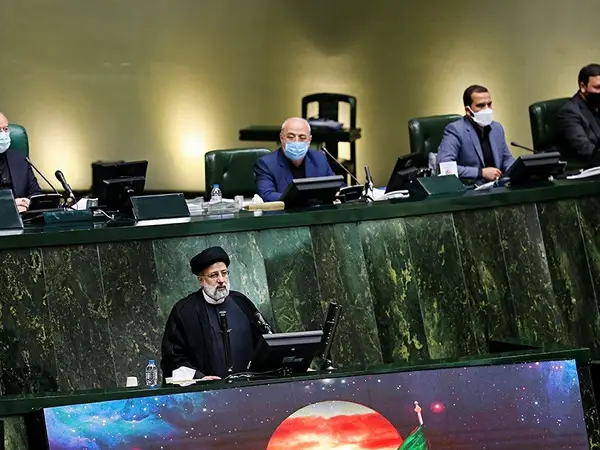The Iranian parliament has approved the outlines of the budget bill for the next Iranian year – starting March 21 -- without considering its unrealistic assumptions.
President Ebrahim Raisi Sunday defended the bill at the parliament by a rhetorical statement, "The strategy of the enemy is to create despair, while the strategy of the government and the parliament should be to create hope in the hearts of the people." The deficit in the current budget that the government admits is about 4,760 trillion rials – more than ten billion dollars. But the real deficit will be perhaps twice as much, with rosy estimates of oil sales and staggering tax collection.
As the bill was being approved, the Iranian currency rial hit a new historic low, dropping to 455,000 against the US dollar. But that did not deter Raisi from claiming that Iran is witnessing “a very bright future,” citing data supposedly indicating that the country’s economy grew in the past year.
He claimed that "this year the country is witnessing an economic growth of four percent," adding that "a million jobs have been created in the country." When he presented the outlines of the budget, he had claimed that economic growth in this budget would be eight percent.
According to an International Monetary Fund report, economic growth will decrease from four percent in the previous Iranian year to three percent in the current year and two percent in the next year. That is still an estimate based on figures mainly supplied by the Iranian government.
Meanwhile, Gholamhossein Shafei, the head of Iran's Chamber of Commerce, said last year that the country's economic growth has been zero in the past 10 years.
The budget bill that was submitted to parliament more than a month late, places its hope on exporting 1.4 million barrels of oil per day, a lofty goal given that US sanctions are in place and Tehran is exporting less than a million barrels under current conditions. The budget also estimates that each barrel of oil can be sold at $85, while that is the highest price in global market, but Iran has to give steep discounts to ship illicit cargoes to its main buyer, China.
The total tax revenues planned in the draft budget will surpass $20 billion based on the current rate of exchange. In Iranian currency, however, this is a staggering 8.3 quadrillion rials – that is with 15 zeros.
Despite the huge tax bill for the people, the government budget will still have a 50-percent deficit, due to a chaotic downturn in the economy mainly triggered by US sanctions on its oil exports and international banking.
The 59-percent jump in planned tax collection means that taxpayers have to pay at least 10 percent more than the estimated 50-percent annual inflation rate.
The Raisi administration started with a rate of exchange for US dollars of 250,000 rials which has so far risen to over 450,000 rials.
Inflation in the country has soared to over 50%, the highest level in decades. Youth unemployment remains high with over 50% of Iranians being pushed below the poverty line, according to reports by Iran's Statistical Center.
The Iranian currency rial has lost its value by more than elevenfold in five years, making imports of food and other essential necessities equally expensive for consumers.
